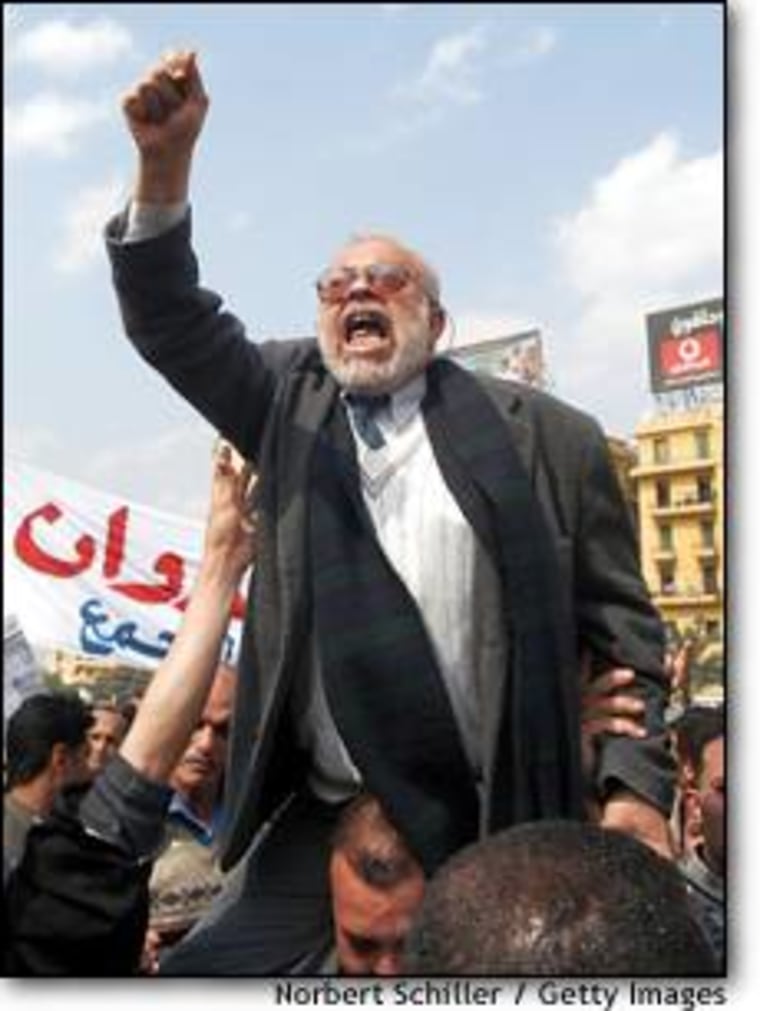There is no mistaking the visceral anger many Arabs feel now that the attack on Iraq has begun. People are siding with Iraq, despite their hatred for Saddam Hussein — even people who call themselves moderate, like several participants in a demonstration this week in Cairo’s Tahrir Square.
“Personally, if I had a chance to fight on the Iraqi side, I would do that,” said Ahmed Eigohary in perfect, American-accented English.
“Iraqi blood will not drive American cars” read one sign at a demonstration.
“Bush is a war criminal!” crowds shouted. “Arab leaders are cowards!”
The crowd of several hundred surged toward the nearby American Embassy. They didn’t make it very far, beaten back first by stick-wielding riot police, and later, when the crowd expanded to more than 1,000, by powerful water cannons.
Arab regimes are more accustomed to muzzling public opinion than managing it. Spontaneous public protests are banned, and many who have vocalized their feelings too loudly in the past have been arrested. But after repeated warnings to the United States that an attack on Iraq would lead to an explosion of anger on the streets, Arab leaders seem to have decided trying to suppress these demonstrators would be more dangerous than trying to control them.
And it’s not just young people who are taking to the streets.
“I came here to protest against the barbaric action of the American administration,” said Abdel Hamid Ghazali, a distinguished-looking professor of political science at Cairo University, dressed in a suit and tie.
“I am very furious as a Muslim and as an Arab to what is happening now,” he said, while a new line of more than 100 riot police moved into position nearby.
EVEN SADDAM FOES OPPOSE U.S.
Does that mean he supports Saddam Hussein? Absolutely not, he said.
“We are not supporting Saddam at all. He is a dictator,” Ghazali said. “We are supporting the Iraqi people. What’s at stake now are the Iraqi people. They are going to be slaughtered by highly sophisticated military technology.”
He, too, believes Iraqis would be better off without Saddam, but said diplomatic efforts should have continued until all options for a peaceful solution were exhausted. He fears an American-led invasion and occupation could have negative consequences in the long term.
Most Arabs simply don’t believe Washington’s stated goal of liberating the Iraqi people. According to an editorial in Egypt’s influential Al-Ahram newspaper: “Invading Iraq is immoral. It is a gross political miscalculation.”
People believe the attack is a grab for oil, or to protect Israel’s interests, or to install a puppet government in Baghdad.
“No one believes his [President Bush’s] promises or pledges if only because there has never been any occupying army in history that has turned into a tool for liberation. Bush’s military adventure is nothing more than the beginning of a new form of American colonialism, and it will benefit no one in the region except Israel,” wrote Egyptian columnist Salama a Salama in Al-Ahram.
ARAB LEADERS ARE ALSO TARGETS
But anger here is not only directed at the Bush administration. One sign at the protest read: “Vive la France. Arab leaders go to hell.” Arab heads of state are being heavily criticized for not doing more to prevent the attack on Iraq, and for allowing Arab soil to be used as a launching pad. Some here believe Saddam Hussein is not the only Arab dictator who should be toppled.
“Saddam is a dictator and like all dictators in the Arab world, they all must be expelled from power. But by our own efforts, not by the Americans,” said Essam Eryan, spokesman for the outlawed Muslim Brotherhood party in Egypt. It wants to establish Islamic governments throughout the Arab world.
Eryan warns if the war is prolonged, and if there are many civilian casualties, there will be a backlash against America.
“The anger might change to be against American interests in the Arab world, many victims — innocent Americans — could die in this conflict,” warns Eryan. “I think the Americans must be expelled from this region forever.”
For now, the anger is limited to public demonstrations. One sign Friday of how nervous the Egyptian government is of the situation spinning out of control: an NBC cameraman was arrested and his tape confiscated as he tried to take pictures of riot police beating protestors with sticks, and using water cannons in downtown Cairo. If the authorities can’t control the demonstrations, they can at least control how much of it the public sees.
(Dawna Friesen is a correspondent for NBC News.)
